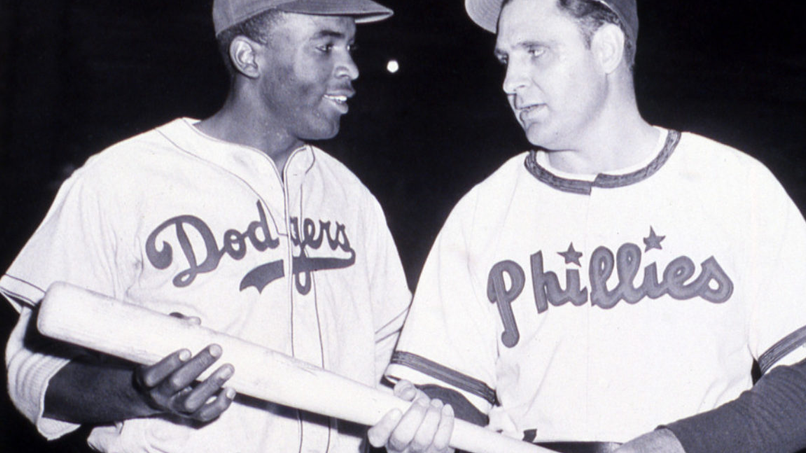 |
| Jackie Robinson stands with Sam Chapman in 1947. | PHOTO & CW: The Rucker Archive |
Standing side by side against the backdrop of the home dugout, Jackie Robinson and Phillies manager Ben Chapman shared a moment captured by flashing cameras. Robinson exuded confidence, his left hand resting on his hip while cradling the bat's barrel in his right hand—a bat that Chapman held firmly by its handle.
In one snapshot, they exchanged smiles, briefly bridging the divide; in the next, their gazes turned forward, hinting at the weight of history in the making.
Now, seventy-plus years later, that photograph endures as a timeless testament. It commemorates a pivotal moment when Jackie Robinson, breaking baseball's color barrier as the first African American player, prepared to take the field outside of New York for the Brooklyn Dodgers, while Chapman’s Phillies hosted the game at Shibe Park.
This visual tribute remains deeply significant—a frozen scene deserving of its place in Cooperstown's hallowed halls.
Yet, beneath the surface of this seemingly harmonious picture lies a nuanced reality. May 9, 1947, was anything but tranquil in baseball's integration journey.
Robinson himself acknowledged the inner struggle he faced, posing alongside Chapman, in his 1972 autobiography—a testament to the complexities he navigated.
The turmoil of that day extended beyond the photograph.
Upon arriving in Philadelphia, the Dodgers encountered adversity as their long-standing team hotel refused service to Robinson and his teammates. Moreover, the public revelation of threatening letters sent to Robinson underscored the ongoing challenges and opposition he confronted, necessitating the involvement of authorities to ensure his safety.
Revisiting this historical snapshot serves as a poignant reminder that progress often emerges amidst adversity and tough choices. Robinson's journey, captured in that single photograph, symbolizes the progress made and the hurdles yet to be overcome in the ongoing pursuit of equality and justice.
In the days leading up to the Dodgers' arrival in Philadelphia, tension simmered. Phillies general manager Herb Pennock's refusal to accept Robinson's presence on the field led to a tense exchange with Brooklyn president Branch Rickey.
“You just can’t bring the n—here with the rest of your team, Branch,” Pennock said, according to a 1976 New York Times story quoting former Dodgers traveling secretary Harold Parrott, who was asked by Rickey to listen in on the call. “We’re just not ready for that sort of thing yet. We won’t be able to take the field against your Brooklyn team if that Robinson boy is in uniform.”
Despite the opposition, Rickey stood firm, willing to accept wins by forfeit rather than compromise on integration.
The Phillies' hostility towards Robinson was not limited to administrative objections. In Robinson's autobiography, he recounted Chapman and other players hurling racial slurs and insults during their previous encounter two wees prior in Brooklyn, depicting a scene that nearly pushed him to his breaking point. This harrowing experience was vividly portrayed in the 2013 biopic "42."
The behavior from Chapman and his club precipitated the organization to release a statement to the Associated Press prior to Friday's series opener at Shibe Park.
“Jackie has been accepted in baseball, and we of the Philadelphia organization have no objection to his playing, and wish him all the luck we can. Baseball is an American game, and there are no nationalities, creeds nor races involved. Jackie Robinson is an American," Chapman said in the statement.
Chapman then told a reporter he would be willing to stand with Robinson for a photograph. Robinson agreed, and the picture has become iconic.
Then came the picture with the bat.
"Mr. Rickey thought it would be gracious and generous if I posed for a picture shaking hands with Chapman,'' Robinson wrote in his autobiography. "I had to admit, though, that having my picture taken with this man was one of the most difficult things I had to make myself do...There were times, after I had bowed to humliation like shaking hands with Chapman, when deep depression and speculation as to whether it was all worthwhile would seize me. ''
Chapman's subsequent statement to the press, seemingly more conciliatory, marked a stark contrast to the hostility Robinson endured. However, actions often speak louder than words, and Robinson's resilience on the field, batting second and contributing with a pair of hits, two runs scores, and a stolen base, spoke volumes that day.
The final score of the game, won by the Phillies in extra innings, fades in significance compared to the enduring impact of Robinson's courage and the ongoing struggle for equality in sports and society at large.
Despite the Dodgers losing three out of four games to the Phillies, Robinson’s resilience shone through with hits in each of those games.
While some accounts suggest that the Phillies' taunts may have been less severe in subsequent encounters, the absence of a public apology from the organization left a lingering mark.
Fast forward sixty-nine years to 2016, when the city of Philadelphia finally took a step towards reconciliation.
Councilwoman Helen Gym spearheaded a resolution to formally apologize "for the racism [Robinson] faced as a player while visiting" the city. This meaningful gesture of acknowledgment and regret passed unanimously, symbolizing progress and recognizing the hardships Robinson endured.
The resolution was then sent to Robinson's widow, Rachel, offering a long-overdue apology and honoring Jackie Robinson's legacy in the ongoing fight against racism in sports and society.


